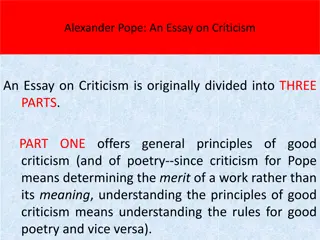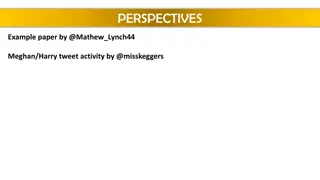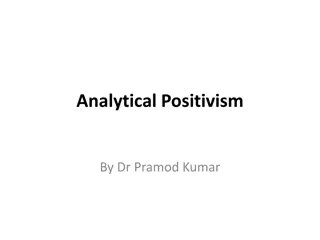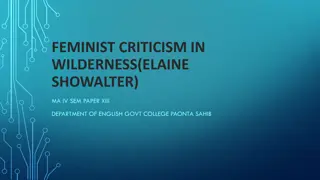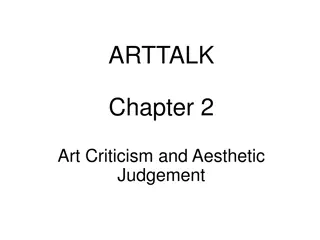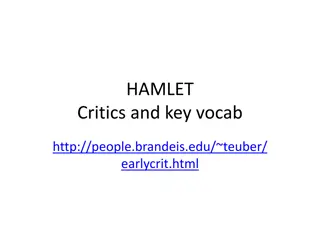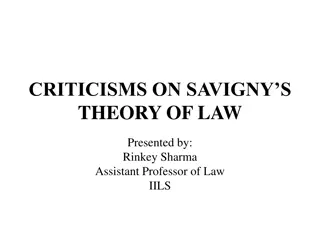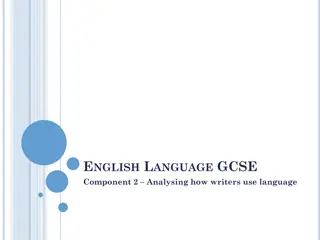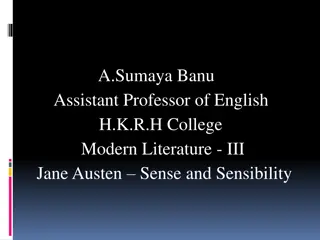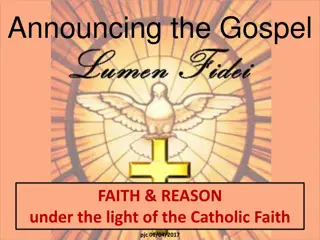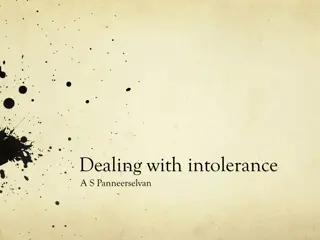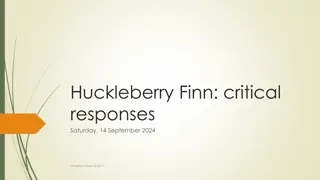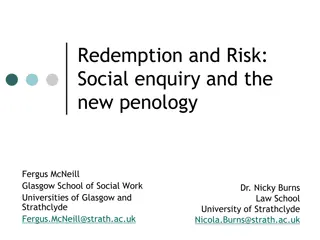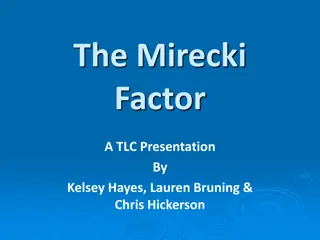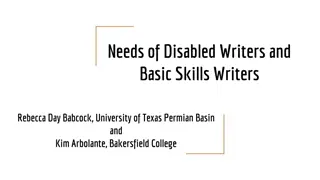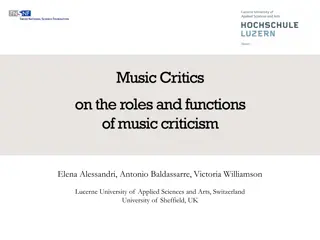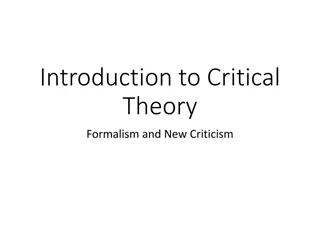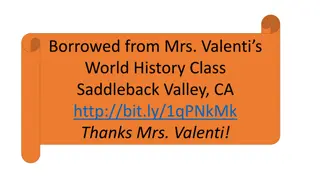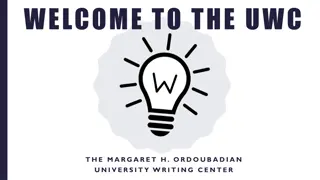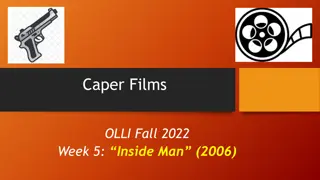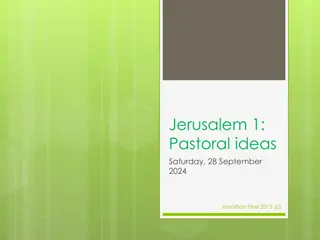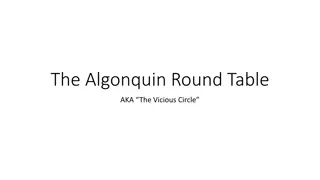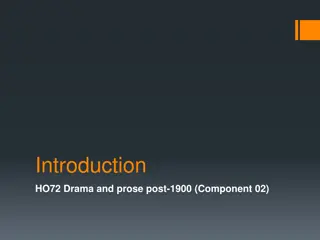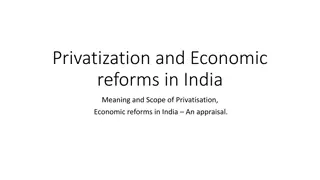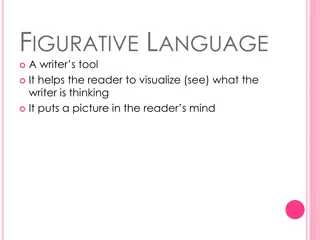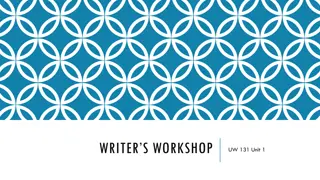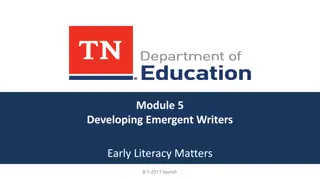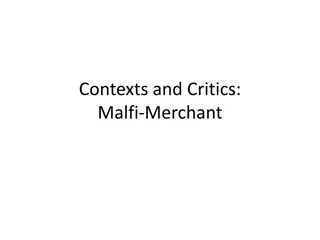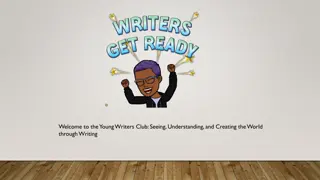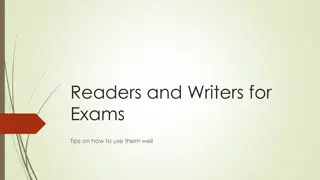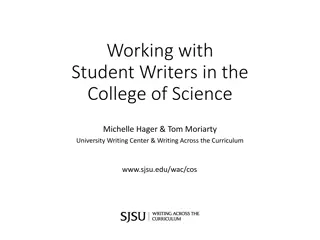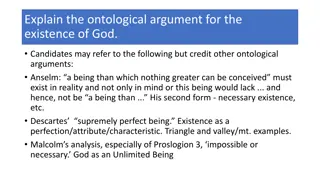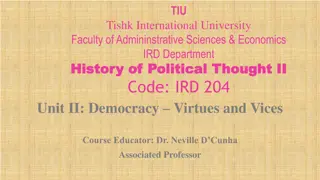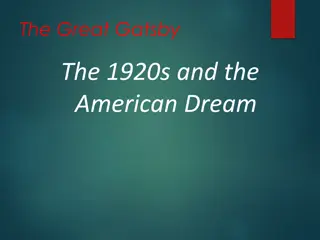Overview of Alexander Pope's "An Essay on Criticism
Alexander Pope's "An Essay on Criticism" is divided into three parts discussing the principles of good criticism, offering solutions to critical problems, and identifying obstacles to good criticism. Part One delves into the challenges critics face due to partial judgments, false learning, and envy.
0 views • 17 slides
Analyzing Perspectives: Writers' Thoughts and Emotions
Delve into the perspectives of writers showcased in an example paper by Mathew Lynch and Meghan/Harry tweet activity by misskeggers. Explore questions on the writers' thoughts, feelings, imaginings, and experiences, and understand how they convey their perspectives through various methods and tones.
0 views • 20 slides
Overview of Analytical Positivism in Legal Theory
The Analytical Positivism school, also known as the Austinian school, emphasizes a sharp separation between law and morality. It views law as a command and emphasizes the importance of law as it is, rather than how it ought to be. This approach, championed by thinkers like John Austin and Jeremy Ben
0 views • 19 slides
Critics and Defenders in Multiculturalism Debate
Critics of multiculturalism argue that its focus on cultural inequalities diverts attention from socio-economic issues, while defenders like Kymlicka advocate for balancing cultural recognition with equal rights. Feminist critics raise concerns about cultural support for individual self-respect, par
0 views • 9 slides
Feminist Criticism in the Wilderness by Elaine Showalter - Analysis
Elaine Showalter's essay "Feminist Criticism in the Wilderness" delves into the realm of feminist literary critique, addressing the diversity among women writers and emphasizing the importance of considering factors beyond gender. Showalter highlights the challenges and goals of feminist criticism w
0 views • 13 slides
Understanding Art Criticism and Aesthetic Judgement
Explore the world of art criticism and aesthetic judgement in Chapter 2 of ARTTALK. Discover the purpose of art criticism, learn to critique art, and understand aesthetic theories. Dive into the realm of professional critics, criteria for judgement, and the importance of forming your own opinions in
0 views • 38 slides
Insights from Critics on Hamlet's Character and Themes
Various critics provide intriguing perspectives on Hamlet's character and the themes within the play. Swinburne emphasizes Hamlet's inner nature as a conflux of forces, while Samuel Johnson views Hamlet more as an instrument than an agent. Von Goethe discusses the challenges faced by Hamlet in fulfi
0 views • 22 slides
Criticisms of Savigny's Theory of Law and Its Impact on Legal Development
Savigny's theory of law, centered around Volksgeist as the sole source of law, has faced criticisms for overlooking other factors influencing legal development. Critics argue that institutions like slavery were not shaped by Volksgeist but by ruling oligarchies, and Savigny's disregard for legislati
7 views • 4 slides
Exploring Writers' Viewpoints Through Music Texts
Dive into a lesson on evaluating writers' viewpoints and perspectives using music texts like Katy Perry's "Chained to the Rhythm." Understand the techniques writers use to convey their ideas and messages, and apply evaluation skills to analyze lyrics effectively.
0 views • 12 slides
Themes and Influences in Jamaica Kincaid's Lucy
Explore the key themes in Jamaica Kincaid's novel Lucy, including identity, colonialism, and rebellion against societal expectations. Reflect on how Kincaid's writing style challenges stereotypes and embraces personal freedom, as discussed by critics like Henry Louis Gates Jr. Connect themes of moth
0 views • 9 slides
Analyzing Writer's Language Use in English Language GCSE Component 2
In English Language GCSE Component 2, students learn to analyze how writers use language. The learning objective focuses on commenting, explaining, and analyzing language use with relevant subject terminology. The exam assesses students on their ability to interpret and explain a writer's thoughts,
0 views • 12 slides
Insights into Jane Austen's Sense and Sensibility
Jane Austen, an English novelist, delves into the themes of marriage, social standing, and economic security in her works, notably in "Sense and Sensibility". The novel follows the lives of the Dashwood sisters, Elinor and Marianne, exploring the contrast between sense and sensibility. With her biti
2 views • 12 slides
Exploring the Relationship Between Faith and Reason in Catholic Beliefs
Understanding the theological virtue of faith and the capacity for reasoning in the context of Catholic teachings. Explore the tension between faith and reason, and the differing perspectives from secular critics and faith-based individuals on the role of faith and reason in society.
0 views • 19 slides
Matthew Arnold's Impact on Literary Criticism and Poetry Evaluation
Matthew Arnold, a prominent Victorian poet and critic, revolutionized literary criticism by emphasizing the importance of knowing and promoting the best ideas in the world through critical evaluation. He introduced scientific objectivity to criticism and influenced a generation of critics. Arnold sa
0 views • 25 slides
Dealing with Intolerance: Challenges Faced by Journalists in India
India, a country of contradictions, struggles with press freedom as journalists face threats and violence. With a backdrop of incidents like the killing of Gauri Lankesh, issues of gender, caste, and hyper-nationalism contribute to a hostile environment for the media. Social media amplifies these ch
0 views • 15 slides
Reception and Criticism of "Huckleberry Finn" in the 19th Century
Huckleberry Finn" faced a mix of reception in the 19th century, with some areas praising it while others criticized its language, humor, and moral tone. The book was banned in Concord but gained popularity in other regions, with critics highlighting its depiction of Southern life along the Mississip
0 views • 17 slides
Redemption and Risk: Social Enquiry and the New Penology
Social enquiry explores transitions from old to new penology, emphasizing risk management over treatment and responsibilization over mitigation. Probation officers act as storytellers shaping perceptions in the criminal justice system, prompting humane responses and social explanations. Research del
2 views • 20 slides
The Mirecki Factor: Controversy Surrounding Dr. Paul Mirecki's Religious Studies Class
The controversy surrounding Dr. Paul Mirecki's proposed class on Creationism and Intelligent Design at the University of Kansas in 2006 is detailed. It delves into the reactions from various stakeholders such as the administration, legislators, and critics, highlighting differing opinions on the tea
0 views • 13 slides
Understanding the Needs of Disabled and Basic Skills Writers in Writing Centers
Explore the challenges and strategies related to disability, basic skills development, and access barriers faced by writers in educational institutions. Learn about evidence-based practices and developmental models to support diverse writers in improving their writing skills.
0 views • 13 slides
Roles and Functions of Music Criticism: Insights from Researchers
Exploring the various aspects of music criticism, this study delves into the role of critics in evaluating music performance, their criteria for assessment, and the impact of their reviews. Researchers interviewed English and German-speaking critics to gain insights into their perspectives and pract
0 views • 20 slides
Understanding Literary Criticism: Formalism and New Criticism
Literary critics analyze and interpret works of literature, delving into social and historical contexts. They focus on techniques, themes, and cross-disciplinary exploration. Formalism, a critical lens, emphasizes internal elements of a text over external influences, seeking universal meanings expre
0 views • 11 slides
Italian Renaissance: Writers and Artists Spotlight
Italian writers like Dante Alighieri and Niccolo Machiavelli made significant literary contributions during the Renaissance period. Dante's iconic work, "The Divine Comedy," showcased societal issues, while Machiavelli's "The Prince" offered political advice emphasizing practicality over theory. Ita
0 views • 22 slides
UWC Margaret H. Ordoubadian University Writing Center Information
The UWC Margaret H. Ordoubadian University Writing Center provides a range of services to help writers at all stages of the writing process. Located in Walker Library, the center offers assistance with brainstorming, drafting, revising, and understanding assignments. Writers can bring various projec
0 views • 13 slides
Understanding the Influence of Advertisements on Society
Analyzing how advertisements influence culture and shape consumer behaviors, focusing on the underlying messages, intended audience, and impact on identity. Exploring critiques of advertising strategies and their broader societal implications through examples and discussions from cultural critics li
0 views • 12 slides
Mastering Concurrency in Operating Systems: Tips and Strategies
Explore intricate concepts in operating systems concurrency from Chapter 6 of CS 345. Learn practical tips and techniques such as determining the size of arrays, managing readers and writers using semaphores, and tackling the Barbershop Problem. Dive into array manipulation, semaphore usage, and pri
0 views • 37 slides
Inside Man (2006) - Film Review and Reception
Inside Man (2006), directed by Spike Lee, received positive critical reception with an 86% rating on Rotten Tomatoes. The film, starring Denzel Washington, Clive Owen, and Jodie Foster, follows a Wall Street bank heist that evolves into a hostage crisis. Critics praised the screenplay and performanc
0 views • 19 slides
Exploring Pastoral Themes and Motifs in Literature
Delve into the world of pastoral literature, where simplicity, nostalgia, and the search for lost innocence prevail. Discover how authors like Virgil, Voltaire, and modern critics explore themes of the Golden Age, Arcadia, and the contrast between rural retreats and urban society. Uncover the timele
0 views • 20 slides
The Algonquin Round Table: A Creative Gathering of the 1920s
The Algonquin Round Table was a diverse group of artists, writers, and critics who met at the Algonquin Hotel in the 1920s, known for their wit and irreverence. Members included notable figures like Dorothy Parker, Robert Benchley, and Harpo Marx, who influenced modern journalism and brought a fresh
0 views • 6 slides
Study of Modern Drama and Prose Post-1900
This component focuses on the study of a modern play (The History Boys) and a modern prose text (The Great Gatsby). Learners explore cultural and contextual influences on writers and readers, analyze literary texts, demonstrate understanding of contexts, and make connections across texts. The examin
0 views • 23 slides
Privatization and Economic Reforms in India: A Comprehensive Overview
Privatization in India involves introducing private ownership and management in publicly owned enterprises, aiming to enhance efficiency, professionalism, and competitiveness. This process includes transferring ownership to the private sector and selling equity in public sector undertakings. The gov
0 views • 26 slides
Understanding Figurative Language in Writing
Figurative language is a powerful tool that writers use to enhance their work by creating vivid images in the reader's mind. This includes techniques such as similes, puns, oxymorons, allusions, foreshadowing, and paradoxes, each serving a unique purpose in conveying deeper meanings and engaging the
0 views • 27 slides
Comprehensive Overview of Writers Workshop Practices and Protocols
Explore the essential elements of Writers Workshop in educational settings, including course introductions, collaborative revision approaches, tuning protocols, and student feedback mechanisms. Learn about effective strategies, outcomes, and lessons learned to enhance the workshop experience for wri
0 views • 7 slides
Developing Emergent Writers: Module 5 Overview
Module 5 focuses on developing emergent writing skills in children through activities that enhance fine motor skills, hand-eye coordination, and left-to-right directionality. Teachers play a crucial role in modeling purposeful writing and providing opportunities for children to experiment with writi
0 views • 11 slides
Influential Writers: Chaucer and Webster in English Literature
Chaucer, born in mid-14th century London, was influenced by French and Italian poets, creating impactful works like "The Canterbury Tales." On the other hand, Webster, born in 1580, crafted dark revenge tragedies like "The Duchess of Malfi," reflecting the troubled mood of his time. Both writers lef
0 views • 7 slides
Exploring the World of Young Writers Club: Writing, Creativity, and Perspective
Delve into the realm of writing with the Young Writers Club, where members immerse themselves in the art of expression, exploring diverse perspectives through words. From quick writes to creating poems using six words, participants engage in thought-provoking activities and gain insights into the po
0 views • 17 slides
Effective Strategies for Using Readers and Writers in Exams
Learn how readers and writers can assist you during exams by decoding text, reading instructions, and more. Discover what they can and cannot do, as well as useful phrases to communicate effectively with them. Explore the benefits of having a scribe for expressing thoughts quickly and effortlessly i
0 views • 10 slides
Enhancing Student Writers' Skills in Science Disciplines
Student writers in the College of Science may struggle with transferring writing skills to new contexts. This article explores why writers forget and provides strategies for teachers to assist students in mastering unique writing genres within science disciplines.
0 views • 25 slides
Ontological Argument for God's Existence and Challenges
The ontological argument posits that a being than which nothing greater can be conceived must exist in reality, not just in the mind. Critics challenge this argument, citing issues with defining God and debating whether existence can be a characteristic. Gaunilo and Kant present criticisms focusing
0 views • 30 slides
Democracy: Virtues and Vices in Modern Politics
In modern politics, the concept of democracy is often unquestioned, with its virtues taken for granted and its vices rarely exposed. This course delves into the historical perspectives on democracy, exploring its advantages for both individuals and the community. While democracy can foster a sense o
0 views • 27 slides
The 1920s: A Decade of Transition and Contrasts
The 1920s in America were a time of significant change and contradictions, marked by the aftermath of World War I, economic boom, social unrest, and cultural shifts. The era saw booming economy, rise of organized crime, implementation of Prohibition, and societal changes in morals and attitudes. Des
0 views • 34 slides
